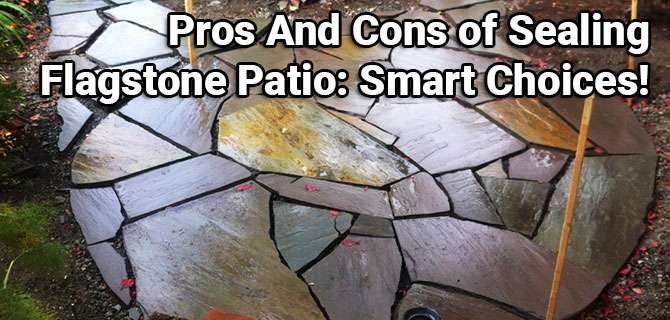Pros And Cons of Sealing Flagstone Patio: Smart Choices!
**Pros: Sealing flagstone enhances durability and prevents stains. Cons: It can alter the stone’s natural appearance and requires regular maintenance.
** Flagstone is a popular choice for outdoor patios, walkways, and garden paths. Its natural, rustic appearance adds charm to any landscape. Sealing flagstone can provide significant benefits, including increased durability and resistance to stains. This protective layer helps maintain the stone’s integrity against weathering and spills.

However, sealing can also change the stone’s natural look, making it appear glossier or darker. Regular maintenance is required to keep the sealant effective, which adds to the long-term cost and effort. Deciding whether to seal Flagstone Patio involves weighing these pros and cons to see what aligns best with your aesthetic preferences and maintenance willingness.
Table of Contents:=>
Pros Of Sealing Flagstone:
Flagstone is a popular choice for patios and walkways due to its natural beauty and durability. Sealing flagstone Patio can enhance its look and longevity, but it’s essential to understand both the advantages and drawbacks. This section will focus on the Pros of Sealing Flagstone Patio.
Protection From Stains:
One of the primary benefits of sealing flagstone is the protection from stains. Flagstone floors and patios are susceptible to spills, dirt, and other contaminants. A high-quality sealer creates a protective barrier, preventing these substances from penetrating the stone. Here are some points to consider:
- Food and Drink Spills: Sealed flagstone pavers are resistant to common spills like wine, coffee, and sauces.
- Oil and Grease: Sealing helps in protecting the stone from oil and grease stains, especially in outdoor kitchens.
- Organic Matter: Leaves, bird droppings, and other organic materials can stain unsealed flagstone. A sealer prevents these stains.
A sealed surface is also easier to clean. You can simply wipe away spills before they set in. This makes maintenance less labor-intensive, saving you time and effort. Protecting your flagstone from stains helps keep it looking new for years.
Enhanced Color And Appearance:
Sealing flagstone patio can significantly enhance its color and appearance. The sealer brings out the natural hues and patterns, making the stone look more vibrant and appealing. This is especially important for flagstone patios and walkways, where aesthetics play a crucial role. Here are a few benefits:
- Brighter Colors: The sealer enhances the natural colors of the stone, making them more vivid.
- Wet Look: Some sealers provide a glossy finish, giving the stone a wet look that many homeowners find attractive.
- Uniform Appearance: Sealing can even out the color variations in the stone, providing a more consistent look.
For those who want their outdoor spaces to stand out, sealing flagstone is a great option. It not only protects but also beautifies, adding to the overall appeal of your property.
Increased Durability
Sealing flagstone can increase its durability, making it more resistant to weathering and wear. This is particularly beneficial for flagstone pavers in high-traffic areas or outdoor settings. Here’s how sealing contributes to durability:
- Weather Resistance: A sealer protects the stone from the damaging effects of rain, snow, and UV rays.
- Prevents Cracking: By sealing the surface, you reduce the risk of cracks and chips, extending the life of your flagstone.
- Reduces Erosion: Sealed flagstone is less likely to erode over time, maintaining its structural integrity.
Increased durability means you won’t have to replace or repair your flagstone patio as often. This not only saves money but also preserves the beauty and functionality of your outdoor spaces. A durable flagstone patio or floor is a wise investment for any homeowner.
Cons Of Sealing Flagstone:
Flagstone is a popular choice for patios and outdoor spaces. It offers a natural, rustic look that many homeowners love. Sealing flagstone can enhance its appearance and protect it from damage. However, sealing flagstone also has its drawbacks. Let’s explore the cons of sealing flagstone.
Potential For Slipperiness
Sealing flagstone can make the surface slippery. This can be dangerous, especially in wet conditions. When the sealant forms a smooth layer on the flagstone, it reduces the natural roughness that provides grip. This is a significant concern for areas with heavy foot traffic.
Consider these points:
- Increased Risk of Falls: A slippery surface increases the risk of slips and falls. This is especially concerning for children and elderly people.
- Impact on Safety: Safety becomes a major issue on flagstone patios or walkways. Wet conditions can exacerbate the slipperiness.
- Weather Conditions: Sealed flagstone can become dangerously slick during rain, snow, or ice.
To mitigate slipperiness, you may need to add non-slip additives to the sealant. This can increase costs and effort. Always weigh the potential safety risks before sealing your flagstone flooring or patio.
Difficulty In Reversing
Reversing the sealing process is challenging. Once applied, sealants penetrate the flagstone surface, making it hard to remove.
Here are some key challenges:
- Labor-Intensive: Removing the sealant requires intense labor. It involves chemical strippers and pressure washing.
- Potential Damage: The removal process can damage the flagstone. Chemicals and pressure washing can erode the stone’s surface.
- Time-Consuming: Reversing sealing is a time-consuming process. It requires patience and significant effort.
Consider this table for a clearer picture:
| Aspect | Challenge |
|---|---|
| Labor | High effort and skill needed |
| Damage Risk | Potential surface damage |
| Time | Lengthy process |
Due to these challenges, think carefully before deciding to seal your flagstone flooring or patio.
High Maintenance
Sealed flagstone requires regular maintenance. This can be time-consuming and costly.
Consider the following:
- Frequent Re-sealing: Sealants wear off over time. This means you need to re-seal the flagstone every few years.
- Cleaning Requirements: Sealed surfaces need regular cleaning. Dirt and grime can build up on the sealant, making it look unsightly.
- Inspection and Repairs: Regular inspections are necessary. Any cracks or chips in the sealant need prompt repair.
Here’s a quick overview:
| Maintenance Task | Frequency |
|---|---|
| Re-sealing | Every 2-3 years |
| Cleaning | Monthly |
| Inspection | Annually |
High maintenance can be a deterrent for many homeowners. Always consider the long-term commitment before sealing your flagstone patio or flooring.
Should I Seal My Flagstone Patio?
Flagstone patios offer a natural, rustic charm that many homeowners love. Deciding whether to seal flagstone pavers can be challenging. Sealing can enhance the look and durability but might not be necessary for everyone. Let’s explore the pros and cons to help you decide if you should seal your flagstone patio.
Sealing flagstone can provide several benefits:
- Enhanced Appearance: A sealer can make the colors of your flagstone more vibrant and attractive.
- Protection from Stains: Sealed flagstone is resistant to stains from food, drinks, and other substances.
- Reduced Erosion: A sealer helps protect the flagstone from erosion caused by water and weather.
- Easy Maintenance: Sealed surfaces are easier to clean and maintain.
Sealing may also have some drawbacks:
- Cost: Sealing can be expensive, especially for large patios.
- Regular Maintenance: Sealers need reapplication every few years, adding to maintenance efforts.
- Potential Slipperiness: Some sealers can make the surface slippery when wet.
When To Avoid Sealing
In some cases, you might choose not to seal your flagstone patio:
- Natural Look Preference: If you prefer the natural, weathered look of flagstone.
- Budget Constraints: If the cost of sealing is prohibitive.
- Low Traffic Areas: For patios that aren’t subject to heavy use.
When Sealing Is Recommended
Consider sealing in these scenarios:
- High Traffic Areas: For patios with heavy foot traffic.
- Exposure to Elements: Patios exposed to harsh weather conditions benefit from sealing.
- Frequent Spills: Areas prone to food and drink spills.
Types Of Sealers
There are different types of sealers for flagstone patios:
| Type | Features |
|---|---|
| Penetrating Sealers | Soak into the stone, providing protection without altering the appearance. |
| Topical Sealers | Create a protective layer on the surface, enhancing color and gloss. |
How To Seal Flagstone
- Clean the Surface: Remove dirt, debris, and stains.
- Choose the Right Sealer: Pick a sealer that suits your needs.
- Apply the Sealer: Follow the manufacturer’s instructions for application.
- Allow to Dry: Ensure the sealer dries completely before use.
Frequently Asked Questions
Should You Put A Sealer On Flagstone?
Yes, sealing flagstone is recommended. It protects the stone from stains, and weathering, and enhances its appearance. Choose a breathable sealer.
Does Sealing Flagstone Keep It From Flaking?
Yes, sealing flagstone helps prevent flaking. It protects the stone from moisture, weather, and wear. Regular maintenance is essential for long-term protection.
Is There A Downside To Sealing Pavers?
Yes, sealing pavers can be costly and time-consuming. It may also make the surface slippery when wet. Some sealants may change the paver color, causing an uneven appearance. Regular maintenance is required to maintain the seal.
Should You Seal A Natural Stone Patio?
Yes, sealing a natural stone patio is recommended. It protects against stains, and weather damage, and enhances durability. Sealed stone also looks more vibrant and is easier to clean. Regular maintenance will extend the patio’s lifespan.
Conclusion
Sealing flagstone offers both benefits and drawbacks. It enhances durability and appearance but requires regular maintenance. Consider your specific needs before deciding. Weighing the pros and cons can help you make an informed choice. Proper care ensures your flagstone remains beautiful and functional for years to come.
Last Updated on October 1, 2024 by Rogers Weber
[As an Amazon Associate I earn from qualifying purchases.]


